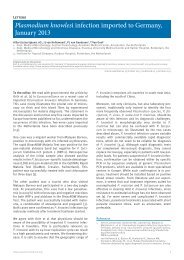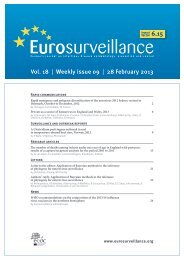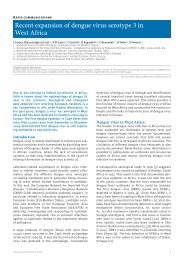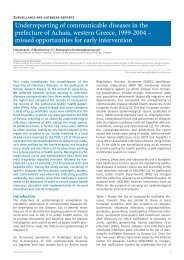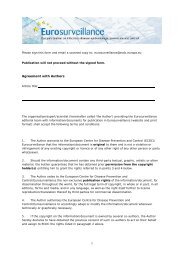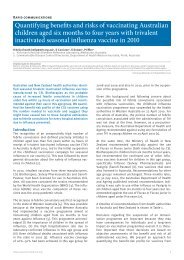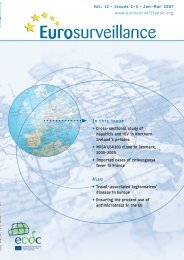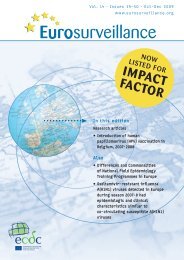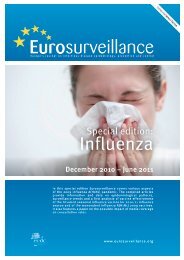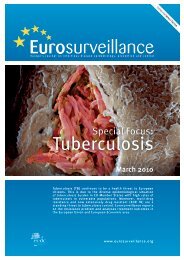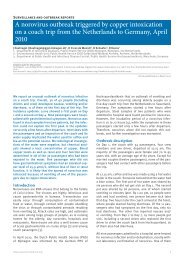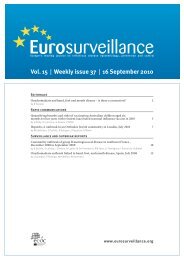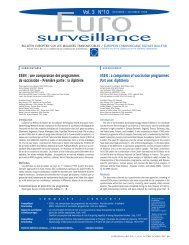Neisseria meningitidis - Eurosurveillance
Neisseria meningitidis - Eurosurveillance
Neisseria meningitidis - Eurosurveillance
You also want an ePaper? Increase the reach of your titles
YUMPU automatically turns print PDFs into web optimized ePapers that Google loves.
‘voluntary’, and ‘decisionally-capacitated’, meaning<br />
that all information needs to be disclosed to a competent<br />
(‘capacitated’) patient, who understands all<br />
that has been disclosed, and that this patient voluntarily<br />
consents to treatment (or to a research subject<br />
when it comes to participation in research) [12]. This<br />
raises important questions about how these informed<br />
consent requirements could be conceptualised when<br />
using molecular techniques in outbreak management.<br />
One such question pertains to formulating information<br />
disclosure requirements: what (type and how much)<br />
information ought to be disclosed and comprehended<br />
in order for someone to be able to legitimately consent<br />
to any type of intervention or procedure proposed by a<br />
public health official? Intertwined with this is the question<br />
of who consent must be obtained from. Due to the<br />
fact that many individuals may be involved in an outbreak,<br />
and because sequence information about the<br />
pathogen in a particular infected individual may give<br />
rise to new information about, for example, relational<br />
patterns to other infected persons, the question of<br />
who exactly, of all the persons involved in an outbreak,<br />
should be consenting to the use of such technologies<br />
remains a pertinent one. Such information could be relevant<br />
to a number of parties involved in an outbreak<br />
for different reasons, and the interests of those parties<br />
in that information could, moreover, conflict with<br />
each other. Furthermore, informing all the parties may<br />
be seen as an unrealistic task, depending on the type<br />
and amount of information that needs to be disclosed<br />
and who must be informed. This is also relevant to<br />
the current management of outbreaks, but molecular<br />
techniques give more specificity about the directionality<br />
of transmission and can be used on a pathogen<br />
obtained from one person and interpreted along with<br />
information obtained from another person. This makes<br />
answering the question to whom disclosures should<br />
be made, who should agree to participate and whether<br />
full comprehension of the information in itself can be<br />
reached even more complex.<br />
Return of results<br />
Another issue that needs to be addressed when using<br />
molecular techniques in outbreak management is the<br />
concept of a ‘return of results’ duty. This concept pertains<br />
to the problem of how and to what extent, or<br />
whether (research) information needs to be returned<br />
to certain parties, for instance, the individual and/or<br />
the public. This is an issue well addressed in biobanking,<br />
where the debate focuses on treatment options or<br />
financial gain [11]. When it comes to outbreak management,<br />
however, the issue is more complex: here it is<br />
not only about the (financial or medical) interests of<br />
specific individuals directly associated with the intervention<br />
but also about the many parties involved in an<br />
outbreak. The interests and needs of specific individuals<br />
need to balanced with those of the general population.<br />
Furthermore, disclosure of information may be of<br />
immediate public health interest and, at the same time,<br />
be harmful to the people directly involved.<br />
Legal perspective<br />
A legal norm or duty and its justification are not the<br />
same as a moral norm or duty and its justification.<br />
Although the presence and adoption of legal duties are<br />
frequently justified (usually at least in part) by ethical<br />
arguments, what ultimately validates a legal norm<br />
is its recognition by a political and/or legal institution<br />
or authority. That is, a legal norm is operationalised<br />
through institutional rules and governance structures<br />
(ranging from laws and regulations to policies and<br />
guidelines). The law attempts to find a coherent position<br />
in balancing population interests versus individual<br />
freedoms [13]. The introduction of novel technologies<br />
into health systems often brings forth new ethical arguments<br />
and this may change the perspective on these<br />
population interests or individual freedoms. However<br />
the present legal norm cannot easily be changed and<br />
cannot even always be directly met by new jurisdiction<br />
[13].<br />
When it comes to the legal framework for controlling<br />
infectious diseases and the protection of public health;<br />
using molecular techniques may not even be a problem<br />
in many European countries [14]. Public health law in<br />
many countries already makes surveillance legally possible<br />
without explicit patient consent [14]; however, to<br />
what extent this includes a legal possibility for microbiological<br />
research and molecular typing in outbreak<br />
management is not well defined.<br />
Conclusion<br />
In light of the ability of molecular techniques to show<br />
potential relational patterns between people and that<br />
this may fuel public discussions about who is responsible<br />
for an infection or outbreaks, it is essential to not<br />
only address operational challenges related to use of<br />
such techniques in outbreak management, but also to<br />
shape the conditions under which they can be used in<br />
practice. Reflection on these conditions may not result<br />
in closure of the ethical debate on topics such as privacy,<br />
consent and moral obligation to avoid infecting<br />
others, but it can offer guidance to public health professionals<br />
who use these techniques in source and<br />
contact tracing.<br />
Call for ethical reflection<br />
In this context, the Dutch Municipal Health Service GGD<br />
Midden-Nederland focuses on the ethical questions<br />
concerning the use of molecular typing techniques in<br />
the control of infectious diseases. Our current project,<br />
supported by the Dutch National Institute for<br />
Public Health and the Environment (RIVM) through<br />
the regional support fund for reinforcement of infectious<br />
disease control, aims at combining public health<br />
ethics with practice. We warmly invite public health<br />
professionals, especially microbiologists, to put their<br />
reflections on the conditions under which molecular<br />
techniques should be used in source and contact tracing<br />
in writing (send them by email to ethiektraining@<br />
ggdmn.nl before 15 March 2013).<br />
108 www.eurosurveillance.org



